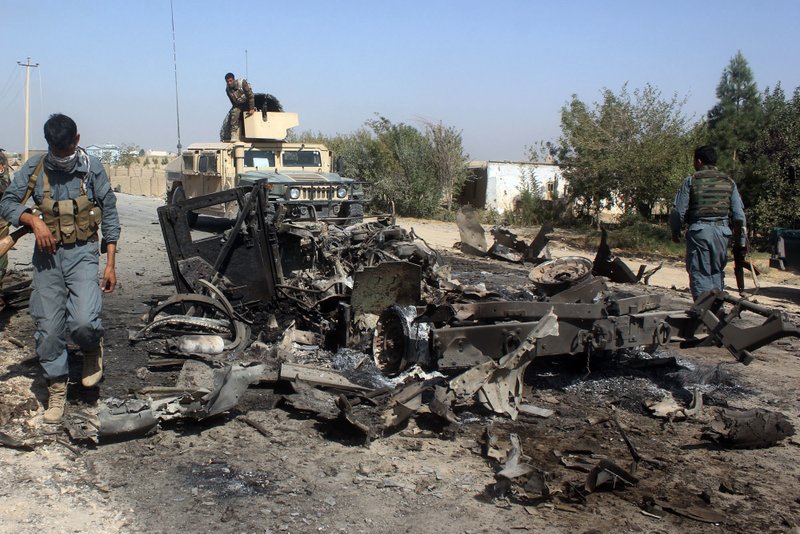The Afghan government welcomed the promises to deploy U.S. troops alongside conventional Afghan forces, saying help is needed in rooting out Taliban insurgents.
"With no doubt, our Afghan forces indefinitely need air and ground support from our American ally, along with assistance on intelligence," Shah Hussain Murtazawi, a deputy spokesman to Afghan President Ashraf Ghani, said by phone on Friday. "Afghanistan doesn't support the reduction of U.S. troops in the country, and their broadened presence is helpful and necessary in combating terrorism."
The decision broadens the existing U.S. military mission in Afghanistan rather than authorizing a new mission, White House spokesman Josh Earnest told reporters. Although the country is still a "dangerous place," President Barack Obama's successor will inherit a "far-improved" situation in the country, Earnest said.
The Taliban said the U.S. change is futile. The U.S. is officially fighting al-Qaeda and Islamic State in its mission in Afghanistan.
"With the U.S.'s new decision to broaden their military role against us, they'll only waste their money, and will suffer extremely with more deaths in the country," Zabihullah Mujahed, the Taliban's main spokesman, said by phone. "They couldn't harm us with their modern weapons, military vehicles and more than 100,000 soldiers a few years ago, so the new announcement is pointless. It's better for the U.S. to leave the country, us and the Afghan government alone. We remain resilient and will fight until all foreign forces leave the country."
U.S. forces will have an expanded mandate to target groups including the Taliban in Afghanistan, aiding their Afghan counterparts not only in training and advising but also in accompanying them on the ground and in the air, an administration official said. The U.S. has had troops in Afghanistan since just after the terror attacks on Sept. 11, 2001.
The 9,800 U.S. troops in Afghanistan are scheduled to drop to 5,500 by the end of this year, but the pace of that decline has yet to be decided. One factor in deciding future troop levels is the extent to which NATO allies are willing to remain involved in training and advising the Afghans.
"It is a realization that the policy that stressed on peace-making and political dialogues was premature and not framed according to ground realities," Omar Samad, a former Afghan ambassador to Canada and France, said in an email. "This is now Obama's war, and part of his legacy will be determined by how he handles the end stage and what he leaves behind for the next administration."
Obama, who ran for his second term on a platform that included ending U.S. involvement in wars in Afghanistan and Iraq, decided in October 2015 to delay a planned draw-down and maintain 9,800 U.S. troops in Afghanistan through 2016. The expanded U.S. role comes less than a month after a U.S. drone strike in Pakistan killed Taliban leader Mullah Akhtar Mohammad Mansour. Obama said that action sent "a clear signal to the Taliban and others that we're going to protect our people" because Mansour and the Taliban had been "specifically targeting U.S. personnel and troops inside of Afghanistan."
The move, which will allow troops to provide Afghan forces with "close-air" support against hostile targets, illustrates U.S. concern about the abilities of Afghan forces to hold their own in the counterterrorism fight on their soil. Obama is under pressure from the Afghan government and some U.S. military leaders to back down on his plans to reduce U.S. forces there.
Defense Secretary Ash Carter said the broader powers will "help Afghans maintain control of the country." Carter will discuss the fight against the Taliban next week in talks at NATO headquarters in Brussels.
Carter said the changes Obama approved amount to "using the forces we have in a better way, as we go through this fighting season," adding, "It's a good use of the combat power we have there."
Gen. John F. Campbell, who was the top U.S. commander in Afghanistan until March, said in an interview Friday that although he had not seen the specifics of the White House decision to expand U.S. military authorities, he welcomed the move. Before Gen. John Nicholson succeeded him in Kabul in March, Campbell had urged the administration to grant expanded authorities to assist the Afghans, arguing that they faced an especially difficult fight against the Taliban this summer.
"I had asked for more authorities for the commander on the ground to help the Afghans out, and if this is what that is, I would be all for it," he said. "We have an ally there that we need to continue to support."
The Afghan conflict has cost the U.S. almost $700 billion and killed more than 2,200 U.S. troops.
Information for this article was contributed by Angela Greiling Keane, Eltaf Najafizada, Chris Kay and Daniel Ten Kate of Bloomberg News and by Robert Burns, Lolita C. Baldor and Lynne O'Donnell of The Associated Press.
A Section on 06/11/2016

